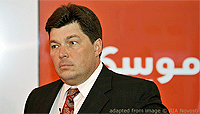Senior senator hails Russian foreign policy concept

(Interfax – Moscow, 17 February) The concept of Russia’s foreign policy that was voiced by Vladimir Putin is aimed at using economic diplomacy and applying “soft power” as well as “the democratization of diplomacy”, head of the Federation Council’s International Affairs Committee Mikhail Margelov has said.
“This concept reflects the fact that today international economic problems cannot always be resolved only by economic means and that today foreign policy institutes are being tasked with using economic diplomacy that is actively developing in our times, at the same time, combining geo-politics with geo-economics,” Margelov said.
Margelov noted that the course on the unchanging nature of the main foreign policy principles in the new circumstances remains.
“Russia will continue to carry it out openly and asserting national interests through the political path remains its main contents,” Margelov said.
He added that Russia’s foreign policy will continue to be built under the supremacy of international law and the UN.
“The country’s leadership considers these principles to be the unalterable base of foreign policy decisions. Russia traditionally ‘balances’ international relations. The concept also envisages the directions of practical activities that will allow Russia to play this role successfully and be a responsible and constructive member of the international community,” Margelov said.
They constitute recognition of the UN’s leading position, opposing interference into internal affairs, democratization of the global financial system and taking into account the cultural difference of various countries.
“Apart from traditional methods of diplomacy, the concept also envisages the so-called ‘soft power’ for reaching these goals. The document ascribes significance to regional directions, above all, integration on post-Soviet space,” Margelov said.
He called the concept “a road map” of Russian diplomatic work and mentioned the detailed analysis of the ‘world that has been changing since 2008″ when the global crisis mingled with international relations as one of its merits.
“The concept notes that the uncertainty of the situation is facilitated by the West’s policy that is aimed at undermining the UN’s authority and violently spreading its values and interfering in the domestic affairs of sovereign countries and subversive activities in the information space and the return of ideology to foreign policy,” Margelov said.
He added that we are facing examples of when attempts are being made to use the UN as a legitimate cover for undermining sovereignty, when support for the “Arab Spring” is turning into the destabilization of the Middle East and Africa and when values are being politicized and used as an instrument of blackmail and pressure.
